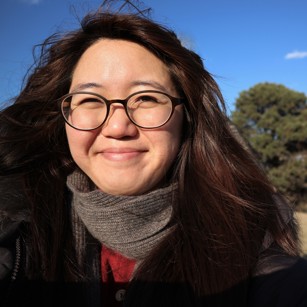O: An Elegy
by Ae Hee Lee
I.
O to forget limón
isn’t lemon O the slow
traveling
scent of fresh rind
to forget
how all things are
made of mind
even stone O and spice
to forget the equivalent
of a centimeter
in inches O the width
of my mother’s back
the rate it shrinks O
down the spiral
staircase of my arms O i’m losing
count of my selves
II.
i won’t forget
the O children in Trujillo
who said they loved me O loved
and mispronounced
my name
but i will
and i’ll give them
faceless frames O
wooden tops and strings O
they’ll grow
out of them O like i should
or shouldn’t (O i forget)
find forgiveness
in their forgetfulness
O most days
i forget how to speak
truth
that thin reed
how to twist it O braid
a lie
a ladder
with such a tongue
III.
O who knows
why the dead
why
roadkill is left
behind and behind
at fifty-five miles per hour O why
do words O stay O
have kernels that weigh
just enough
IV.
this O
isn’t deterioration
this deterioration O just body
O everybody knows
every day dies
like a grotto
unprayed into ruins O and yet
how some mouths
cradle starlings O small hymns
that flutter for each
which dies O everyday
V.
how some days i want
i want so O suddenly
to be naked O
from these shoes
and dance
marinera
like i used to with a boy
of O sun-varnished hands
pinch a cloud O let it shudder
over shoulders
O over our fading
eyes
I’m baffled by memory: its fickleness and fragility, how these very qualities compel us to treasure and honor. There are times I feel embarrassed because I can’t recall the minute details of happenings, places, names, and bodies. Though generally it’s deemed natural to forget some things, and I consider myself rather unskilled in the art of remembrance, I started questioning how much of it was me deciding, consciously or unconsciously, which things were important to me or I wanted to commit to memory. Tiny pieces constantly disappeared into an ocean of blurred edges I didn’t follow, since I was seemingly busy pushing forwards, but then I asked myself who would I be without these memories, these smallnesses. Even the unreliable ones have shaped me. And isn’t the way we remember also part of who we are or wish to be?
This poem was a kind of following. We write elegies to remember, retrace. Or, at least, to try. I think there’s something wondrous in our attempts.
 Born in South Korea and raised in Peru, Ae Hee Lee is the author of poetry chapbooks Bedtime || Riverbed, Dear bear, and Connotary. Most recently, her full-length poetry collection ASTERISM has been awarded the 2022 Dorset Prize by John Murillo and will be published by Tupelo Press in 2024.
Born in South Korea and raised in Peru, Ae Hee Lee is the author of poetry chapbooks Bedtime || Riverbed, Dear bear, and Connotary. Most recently, her full-length poetry collection ASTERISM has been awarded the 2022 Dorset Prize by John Murillo and will be published by Tupelo Press in 2024.